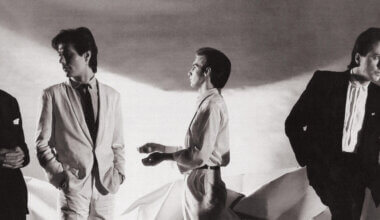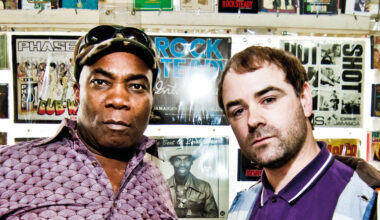Taking it upon himself to preserve the almost lost language of his Canadian ancestors, Jeremy Dutcher has created a singularly important record in the award-winning ‘Wolastoqiyik Lintuwakonawa’
“When you bring the songs back, you’re gonna bring the people back,” says a woman’s voice on ‘Eqpahak’ (‘Savage Island’), a track from Jeremy Dutcher’s 2018 Polaris Prize-winning album ‘Wolastoqiyik Lintuwakonawa’. It’s a snippet of conversation between Dutcher and Maggie Paul, an elder in his community. It serves as a guiding mantra for what this incredibly personal journey of an album represents.
Translating as ‘Songs Of The People Of The Beautiful River’, Dutcher’s album is entirely delivered in his native Wolastoqey language. That tongue belongs to the people living along the Wolastoq River, rebranded by Canada’s French settlers as Fleuve Saint-Jean in an area of north eastern Canada now known as New Brunswick. Thanks to the ongoing pervasive influence of the 1876 Indian Act and the successive programmes of “Canadianisation” inflicted on some of North America’s earliest inhabitants, communities like the Wolastoqiyik have become marginalised. Living on designated reservations where access to basic necessities like electricity and water is limited, and the rights to their land are disputed, puts these people in a perpetually debilitating David and Goliath struggle. Remember this is Canada, a country that the rest of the world generally regards as the nicest of the nice.
“Canada’s got a good PR team, let me tell you that,” quips Dutcher, sarcastically.
One of the casualties of that attempt by governments to strip Canada of its indigenous history is the Wolastoqey language, and fewer than 100 individuals that are fluent in the dialect now remain. If we were talking a species of animal, society would be aghast, expending huge amounts of time, energy and money trying to prevent it from slipping into extinction. Not so for endangered languages.
Dutcher’s project seeks to address that, at least in part. ‘Wolastoqiyik Lintuwakonawa’, released in 2018, arrived in the midst of what he describes as a “indigenous renaissance”, with acts like A Tribe Called Red and Tanya Tagaq shining the spotlight on their own First Nations heritage and encouraging an awareness of Canada’s uncomfortable identity crisis.
Encouraged by Maggie Paul, Dutcher, a tenor and pianist, found himself reinterpreting songs from his people that had been recorded over a hundred years ago by an anthropologist working with Thomas Edison’s then-revolutionary wax cylinder technology. His original aim was to provide access to songs that his people often weren’t aware of, songs that embodied life working on the land and the river, and maintain their memory in his community.
“We have an expression in my language, ‘psiw-te npomawsuwinuwok, kiluwaw yut’,” says Dutcher. “That means ‘all my people, this is for you’.”
Nevertheless, despite wanting this to be a locally-focussed project, the emotions it stirs have put him at the centre of this renaissance, providing a clarion call for suppressed cultures across Canada and as far away as Norway. Indeed, back in March Dutcher won Indigenous Music Album Of The Year at the prestigious Juno, the Canadian Music Awards, which no doubt sits nicely alongside the 2018 Polaris Music Prize for the best Canadian album, full stop.
Dutcher was studying for a BA in Music and Social Anthropology at Dalhousie University, Nova Scotia, in 2012 when he had a fateful conversation with Maggie Paul at her kitchen table.
“She’s what we call a song carrier,” he says. “She knows all of our old songs, she’s the carrier of them. She said that if I wanted to know about our really old songs then I had to go to the Museum Of Canadian History, and there, at that museum, sat this archive of my people, the wolastoqiyik.”
That archive contained all sorts of historic artefacts, but for Dutcher the most important discovery was the wax cylinder recordings of William Mechling, himself an anthropology student who spent seven years living among the Wolastoqiyik people just after the start of the 20th century.
“These were very early prototype wax cylinders,” says Dutcher. “The canisters that they came in still have Edison’s name on them in big scrolled letters, and some of the earliest known recordings of field music ever made just happened to be from my people.”
Wax cylinders may have lost the format war to the shellac disc, but their key appeal was the ability for people like Mechling to record roughly three minutes of audio directly to the soft exterior. Using special equipment that was just about portable enough to record the Wolastoqiyik and their songs, such documents provide an unrivalled window into historical culture and the prevailing traditions of the time.
“When I first came to hear these voices, it was a really special moment for me,” says Dutcher. “You can hear the life of my people in them.”
Some one hundred archive recordings sat in the Museum’s Wolastoqiyik archive. Over the course of the next few years, Dutcher recorded and transcribed each and every song, before composing new arrangements for his distinctive and haunting tenor voice, and everything from piano and strings to the sensitive, atmospheric electronics of ‘Qonute’ (‘Welcome Chant’). Interspersed throughout are some of the original recordings and the accompanying ghostly patina of a century’s worth of near-impenetrable surface scratchiness. It’s here that you experience the distinctive original melodies that Dutcher wanted to retain in the 11 pieces that comprise ‘Wolastoqiyik Lintuwakonawa’.
“I wanted them to be visible and bring them forward in that way,” says Dutcher. “I like to think of it as a sort of co-created conversation between my ancestors and I.”
From the segments of the original cylinder recordings you can hear on pieces like the uplifting ‘Essuwonike’ (‘Trading Song’) and ‘Oqiton’ (‘Canoe Song’), Dutcher’s arrangements are evidently vastly different from the sparse way the songs were originally presented. I wonder if he ever felt uncomfortable or unfaithful veering so far from those recordings.
“I was reading Mechling’s field notes about our practice of performance,” he says. “He described the way that the song carrier will get up and share a melody that everyone knows a couple of times, so everyone gets the vibe of the song: they know what song it is, and they know how we’re doing it. Then the singer would go off on their own tangent and put themselves in the piece, and so for me, this was the ultimate permission to say it’s about your voice too. It’s not just about bringing those voices forward and putting them in a contemporary moment. It was always about that balancing act of really trying to respect that old melody, and bringing it forward, and letting it guide my process, but also not shying away from what I wanted to say too.”
Maggie Paul’s comment that “when you bring the music back, you bring the people back” might sound aspirational, but it is precisely what may well happen.
“I hope that’s what happens too,” ponders Jeremy Dutcher. “There’s examples of this happening in the Mohawk community. They really dug into the archive, they brought all that information back into the community, and now, all of a sudden, they have schools teaching their language again, they have fluent speakers graduating and going off and doing amazing things in their language. It’s just an exciting time and it’s going to create a whole new generation of creators, and I’m glad to be a part of that.”
‘Wolastoqiyik Lintuwakonawa’ is out on Fontana North






